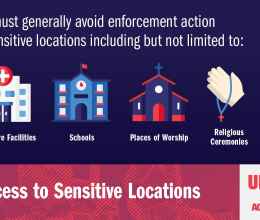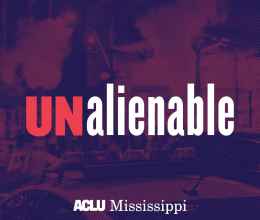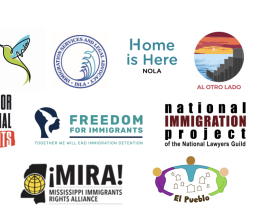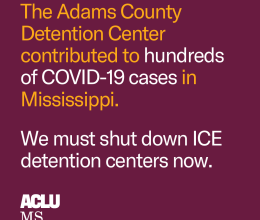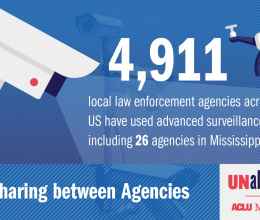
Mississippi is a state of locals—one in which undocumented immigrants are an undeniable part. Almost 80 percent of undocumented Mississippians have lived in the United States for over five years. These individuals and their families, many of whom are Hispanic, are our friends and neighbors. They make up the fabric of our communities. As Mayor William Truly Jr. of Canton articulated at a field hearing on the 2019 ICE raids, Mississippi immigrants “are not gang members, rapists, or murderers, but folks who work, pay taxes, purchase goods, [and] take care of each other and their families.”
Despite immigrants’ indispensable position at the local level, Mississippi counties are currently rated as amongst the highest in the country in terms of their involvement with Immigration and Customs Enforcement (ICE). We share places of worship, our children attend the same schools, yet undocumented immigrants and their families are increasingly driven into hiding by the threat of federal immigration authorities whose presence in our communities is made possible through arrangements with local law enforcement.
This policy brief outlines several ways in which this interagency entanglement takes place. The brief is divided into three sections. First, it addresses ICE detainers, which extend local detention to facilitate the transfer of an individual to ICE custody. Second, it assesses state and local practices and policies that lead up to that initial detention. And finally, it provides recommendations for local, state, and federal entities.
ICE DETAINERS
ICE detainers are voluntary requests in which federal immigration authorities ask local jails to hold individuals for up to an additional 48 hours after their initial detention period. The threats they pose to local policing and communities are expansive:
- Obstruction of Local Policing: Scott County Sheriff Mike Lee and a majority of prosecutors, judges, and police officers identify the intrusion of federal immigration enforcement as an obstacle to their public safety priorities.
- The COVID-19 Pandemic: Holding people in detention increases jail occupancy and can “amplify epidemics,” according to public health experts.
- Impact on Local Economies: Facilitating the detention and deportation of some immigrants drains local economies by removing a primary source of labor and tax revenue.
- Legal Liability: Local agencies and officials can be and have been sued for effectuating ICE detainers, costing these groups millions in settlements and court fees.
ABUSIVE POLICING
Academic research and community testimony confirm that the existence of a pipeline from local to federal agencies promotes discriminatory policing and public harm at the local level. The practical effects include:
- Roadblocks in areas with higher concentrations of Hispanic residents;
- Deterrence of undocumented immigrants and their families from reporting crimes and emergencies to the police; and
- Discriminatory treatment by police officers of Hispanic-appearing drivers in traffic stops and community interactions.
POLICY FRAMEWORK
Mississippi’s legislative framework exacerbates the damage caused by local-federal entanglement. There are two sites in which these policy obstacles are most apparent:
- Prohibition on Sanctuary Cities: While Mississippi’s 2017 Senate Bill 2710 bans sanctuary cities in our state, research shows that sanctuary policies actually correspond with lower crime rates and greater compliance with federal law.
- Status-Requirement for Government IDs: A lack of government-issued ID affects most undocumented immigrants’ abilities to open bank accounts and legally drive. The resulting vulnerability makes them disproportionately victims of home invasions, stopped for minor traffic violations, and fined exorbitant sums when trying to complete everyday tasks.
To view the full policy brief, click here.
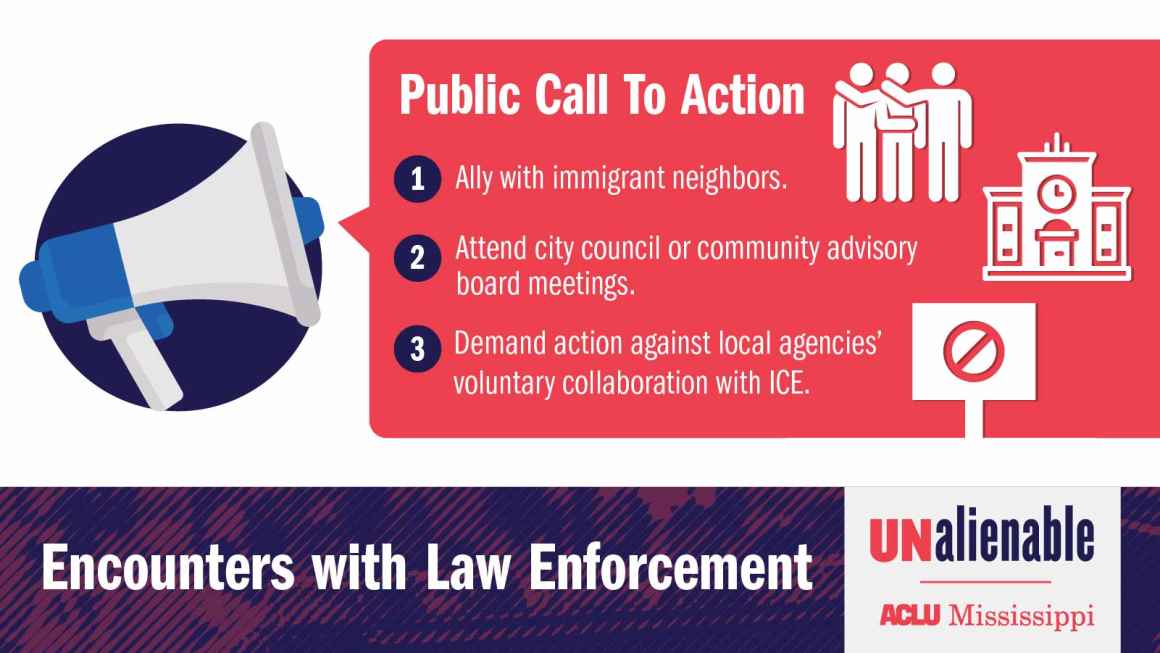
RECOMMENDATIONS
For state and local bodies
- Remove immigration status-related requirements for driver’s licenses
- Issue policies to ensure unbiased policing
- Enhance the transparency of local agencies’ involvement with immigration enforcement
- Create secure and accessible complaint mechanisms for victims of discriminatory policing
- Improve police officer outreach with the immigrant community
- Implement cultural consciousness in police training and hiring
For the Biden administration and federal agencies
- End the ICE detainer regime and any other agreements that allow local assistance in federal immigration enforcement
- Produce a public report with recommendations on the civil rights impact of local-federal entanglement
- Conduct civil rights trainings for immigration enforcement officers
